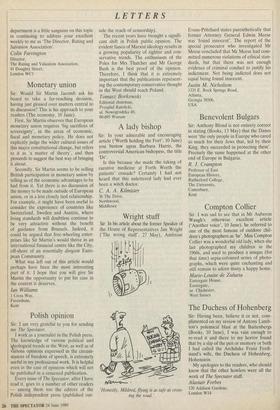Monetary union
Sir: Would Sir Martin Jacomb ask his board to take a far-reaching decision, having just glossed over matters central to its discussion? This is his approach to your readers (The economy, 10 June).
First, Sir Martin observes that European monetary union requires 'big sacrifices of sovereignty', in the areas of economic, fiscal and monetary policy. He does not explicitly judge the wider cultural issues of this major constitutional change, but refers to it as 'a matter of theory', and then proceeds to suggest the best way of bringing it about.
Secondly, Sir Martin seems to be selling British participation in monetary union by telling us of the economic advantages to be had from it. Yet there is no discussion of the money to be made outside of European union, or in a less closely tied relationship. For example, it might have been useful to consider the experience of countries like Switzerland, Sweden and Austria, where living standards will doubtless continue to be very attractive without the benefit of guidance from Brussels. Indeed, it could be argued that free-wheeling enter- prises like Sir Martin's would thrive in an international financial centre like the City, off-shore of an essentially dirigiste Euro- pean Community.
What was left out of this article would perhaps have been the most interesting part of it. I hope that you will give Sir Martin the opportunity to put his case in the context it deserves.
Ian Williams 1 Cress Way, Faversham, Kent










































































 Previous page
Previous page